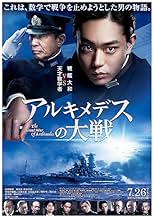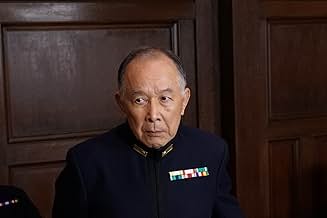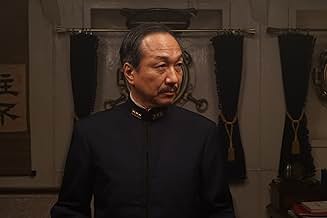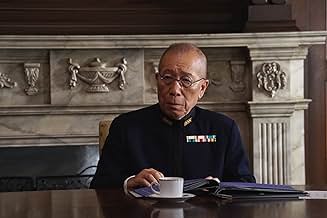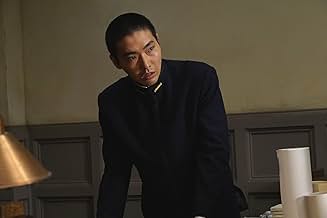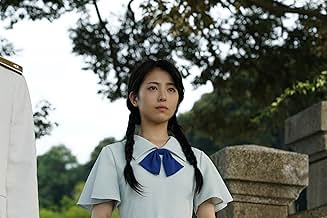Arukimedesu no taisen
- 2019
- 2h 10m
IMDb RATING
6.7/10
1.3K
YOUR RATING
In 1933, a young naval officer and math prodigy uncovers a conspiracy regarding the construction of Japanese warships for the ongoing World War 2.In 1933, a young naval officer and math prodigy uncovers a conspiracy regarding the construction of Japanese warships for the ongoing World War 2.In 1933, a young naval officer and math prodigy uncovers a conspiracy regarding the construction of Japanese warships for the ongoing World War 2.
- Director
- Writers
- Stars
- Awards
- 4 nominations total
T.J. Anthony
- Osami Nagano
- (English version)
- (voice)
Luis Bermudez
- Mr. Osato
- (English version)
- (voice)
Jacob Eiseman
- Various Soldiers and Walla
- (English version)
- (voice)
Alex Hom
- Shojiro Tanaka
- (English version)
- (voice)
Chase Kloza
- Additional voices
- (English version)
- (voice)
Lizzy Laurenti
- Walla
- (voice)
Nicholas Markgraf
- Additional Voices
- (English version)
- (voice)
- …
- Director
- Writers
- All cast & crew
- Production, box office & more at IMDbPro
Featured reviews
This is a fictionalized story is based on a manga and is not meant to be historically accurate. The first exciting 15 minutes of the movie made me think it was a war film. Instead it is a tale of a mathematician, who 9 years before the battle, tried heroically to prevent a money wasting battleship from being built for Japan's pre-WW2 navy instead of a carrier built on behalf of the forward thinking General Yamamoto.
The attack on the battleship at the beginning was well done and exciting. The main character ,played by Masaki Suda, gives an award-winning quality performance. The rest of the cast is good as well. Watching it in the original Japanese will better reflect their performances. There are some not so believable elements that you'll need to put aside in order to better enjoy the film. The final act has a poignant and surprising twist.
The attack on the battleship at the beginning was well done and exciting. The main character ,played by Masaki Suda, gives an award-winning quality performance. The rest of the cast is good as well. Watching it in the original Japanese will better reflect their performances. There are some not so believable elements that you'll need to put aside in order to better enjoy the film. The final act has a poignant and surprising twist.
I watched the Japanese language version of this movie last night and was impressed with the Japanese cast and their performances. I was unaware that an English dub existed until doing a little research today.
After watching the English dub, I was impressed by all of the English dub actors except for one. The most important one. I'm referring to the lead role of Tadashi Kai originally (well) played by Masaki Suda. Suda's performance was both impressive and expressed the realism that should be expected of a lead actor.
However: The English voice actor chosen to portray the character of Tadashi Kai did a huge disservice to the entire tone of the role. While I will give "Derick Snow" exceptionally high marks for his many performances as a dub actor in the wonderful world of Japanese Anime, his portrayal of "Lt. Commander Tadashi Kai was both childish and demeaning. Snow made the lead actor in this movie sound like a pansy. It was actually quite embarrassing. One can only hope that Masaki Suda never hears how he was portrayed by an American actor.
You may say that this is one man's opinion, and you would be correct. However I have made my living using my own voice in the broadcast media industry for more years that I care to count these days. Hate me if you will, but I stand by my words.
Just another voice in the crowd :)
After watching the English dub, I was impressed by all of the English dub actors except for one. The most important one. I'm referring to the lead role of Tadashi Kai originally (well) played by Masaki Suda. Suda's performance was both impressive and expressed the realism that should be expected of a lead actor.
However: The English voice actor chosen to portray the character of Tadashi Kai did a huge disservice to the entire tone of the role. While I will give "Derick Snow" exceptionally high marks for his many performances as a dub actor in the wonderful world of Japanese Anime, his portrayal of "Lt. Commander Tadashi Kai was both childish and demeaning. Snow made the lead actor in this movie sound like a pansy. It was actually quite embarrassing. One can only hope that Masaki Suda never hears how he was portrayed by an American actor.
You may say that this is one man's opinion, and you would be correct. However I have made my living using my own voice in the broadcast media industry for more years that I care to count these days. Hate me if you will, but I stand by my words.
Just another voice in the crowd :)
This starts with the sinking of the Yamato during WWII. Back in 1933, the heads of the Japanese Navy are gathering to decide on the construction of a new ship. Forward thinking Admirals, Yamamoto and Nagano, foresee the coming obsolescence of the battleship. They are pushing for an aircraft carrier but they are losing out to the old guards who want to build a gigantic battleship. They recruit military-hating obsessive mathematician Tadashi Kai to discredit the low-ball cost estimates of their rivals.
This is a different kind of war story. The start has plenty of CGI action but the bulk of this is about the procurement process. The drama is not particularly high since the general outcome is foretold by history. We know that Japan is building both and many more ships. More importantly, the war is inevitable. One side wants it and the other side expects it. Kai may be naive enough to think he can stop the war but the audience is never fooled. The end does have a few unexpected turns but the final direction remains the same. Also, measuring a battleship with a tape measure is more than silly. The obvious move is to steal or cajole all the costs and blueprints of previous ship constructions. Essentially, they arrive at that same idea eventually. The story does hold one surprise for its climax which I like but the tension is always held back due the overall inevitability.
This is a different kind of war story. The start has plenty of CGI action but the bulk of this is about the procurement process. The drama is not particularly high since the general outcome is foretold by history. We know that Japan is building both and many more ships. More importantly, the war is inevitable. One side wants it and the other side expects it. Kai may be naive enough to think he can stop the war but the audience is never fooled. The end does have a few unexpected turns but the final direction remains the same. Also, measuring a battleship with a tape measure is more than silly. The obvious move is to steal or cajole all the costs and blueprints of previous ship constructions. Essentially, they arrive at that same idea eventually. The story does hold one surprise for its climax which I like but the tension is always held back due the overall inevitability.
First it must be stated that this in no way is a 'war movie' as most think of it. The only direct depiction of battle occurs in the beginning of the movie, and as others have said requires some background knowledge of the actual history to grasp what is being depicted. However, I found it striking (and others without the historical knowledge can do likewise) to think back on this scene after the architect describes the ship's purpose later in the movie. I have no idea how accurate the movie is in depicting the actual sentiment's of the architect, but regardless it struck me and made me rethink how I viewed the construction of the ship in question.
At this point it must also be said that the dubbing of the movie does it no favors (besides not requiring a fluency in Japanese to view). The dubbed voices of all figures accept Yamamoto seemed to me to often not reflect the sentiments of the action depicted, which does detract from the viewing experience. However, they do serve to make the movie understandable for non-Japanese speakers such as myself, and for that at least I am grateful. I'm not sure if it is possible to watch the movie in Japanese but simply with English subtitles, but it is something to look into if you find the dubbing too jarring to watch the movie otherwise.
Returning to the rest of the movie, it follows the discussion of how the Imperial Japanese Navy (IJN) planned to expand during the 1930s, when war with the world was not yet actuality, but could be seen on the horizon. It therefore closely examines (with a background of the internal politics of the Japanese armed forces) the debate over two potential paths of expansion, and the costs behind each one. Cue the wiz-kid with a knack for numbers, called in to question the expected costs of one of the plans. And here is where the viewer intent on a stereotypical war movie will lose interest; but for those who continue watching, they will likely leave with a much greater appreciation for all of the abstract mathematical concepts they suffered through in school (I know I for one left seeing much better the usefulness of optimization and regression than when I began). This is a war movie that considers the intellectual backing of the effort, whether that be calculations, counterintelligence, or even how to effectively utilize (or counter if need be) the underpinnings of a nation at war; and that is not something with a terribly large audience of interest. But for those interested in such things, I found the movie a terrific watch.
At this point it must also be said that the dubbing of the movie does it no favors (besides not requiring a fluency in Japanese to view). The dubbed voices of all figures accept Yamamoto seemed to me to often not reflect the sentiments of the action depicted, which does detract from the viewing experience. However, they do serve to make the movie understandable for non-Japanese speakers such as myself, and for that at least I am grateful. I'm not sure if it is possible to watch the movie in Japanese but simply with English subtitles, but it is something to look into if you find the dubbing too jarring to watch the movie otherwise.
Returning to the rest of the movie, it follows the discussion of how the Imperial Japanese Navy (IJN) planned to expand during the 1930s, when war with the world was not yet actuality, but could be seen on the horizon. It therefore closely examines (with a background of the internal politics of the Japanese armed forces) the debate over two potential paths of expansion, and the costs behind each one. Cue the wiz-kid with a knack for numbers, called in to question the expected costs of one of the plans. And here is where the viewer intent on a stereotypical war movie will lose interest; but for those who continue watching, they will likely leave with a much greater appreciation for all of the abstract mathematical concepts they suffered through in school (I know I for one left seeing much better the usefulness of optimization and regression than when I began). This is a war movie that considers the intellectual backing of the effort, whether that be calculations, counterintelligence, or even how to effectively utilize (or counter if need be) the underpinnings of a nation at war; and that is not something with a terribly large audience of interest. But for those interested in such things, I found the movie a terrific watch.
The Great War of Archimedes is Takashi Yamazaki's second stab at similar themes he would later refine further in the glorious Godzilla Minus One, yet he handles said themes in way more cynical approach than what we saw with the big lizard. With The Great War of Archimedes, Yamazaki explores all the political and personal ramifications of building what would become the Yamato would cause Japan, inevitable war. In a way, it feels extremely derivative of Yamazaki's earlier The Eternal Zero, acting as a self-aware commentary on Japan's militarism and contemporary national ethos. Much of the film is a courtroom drama, but Yamazaki does manage to sneak in a lot of fabulously executed action, he's one of the best Japanese filmmakers when it comes to utilising CG to augment his set pieces. Combine this with some stirring performances from its cast and a gorgeous score by Naoki Sato leaves The Great War of Archimedes as another underseen gem in Yamazaki's extensive filmography.
Did you know
- TriviaAt about 5:30, the ammunition magazines on the battleship Yamato explode, after which the capsized (inverted) bow of the Yamato rises up from the water into a vertical position before sinking. This mirrors the manner in which the future Space Battleship Yamato is destroyed in Uchû senkan Yamato: Kanketsuhen (1983), which itself was later recreated in the reboot series The Trap on All Sides (2012) (albeit her "destruction" in this case only being a ruse to deceive the enemy).
- How long is The Great War of Archimedes?Powered by Alexa
Details
- Release date
- Country of origin
- Official sites
- Language
- Also known as
- The Great War of Archimedes
- Production companies
- See more company credits at IMDbPro
Box office
- Gross worldwide
- $16,454,674
- Runtime2 hours 10 minutes
- Color
Contribute to this page
Suggest an edit or add missing content


![Watch Trailer [OV]](https://m.media-amazon.com/images/M/MV5BZmVlZWNmMmMtYmUxMy00MGQ5LWIyMTMtYTRlY2E1M2M0OWNkXkEyXkFqcGdeQXRyYW5zY29kZS13b3JrZmxvdw@@._V1_QL75_UX500_CR0)
